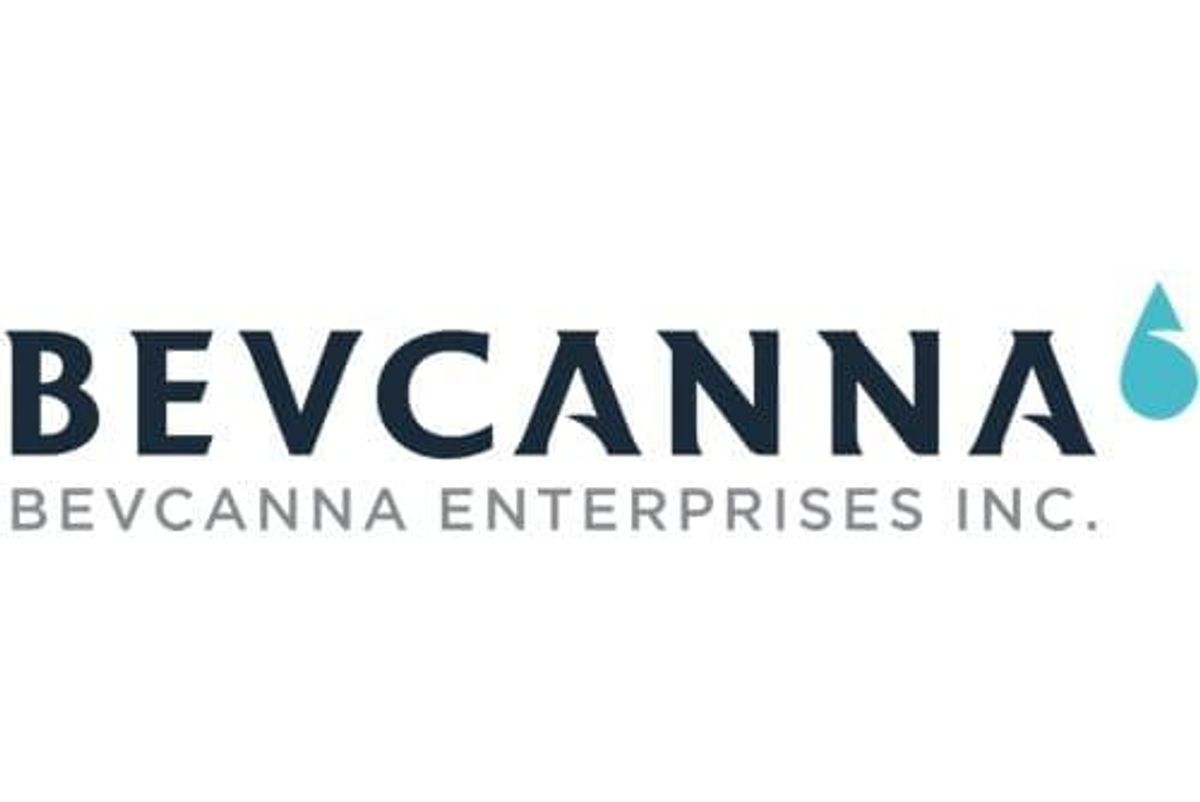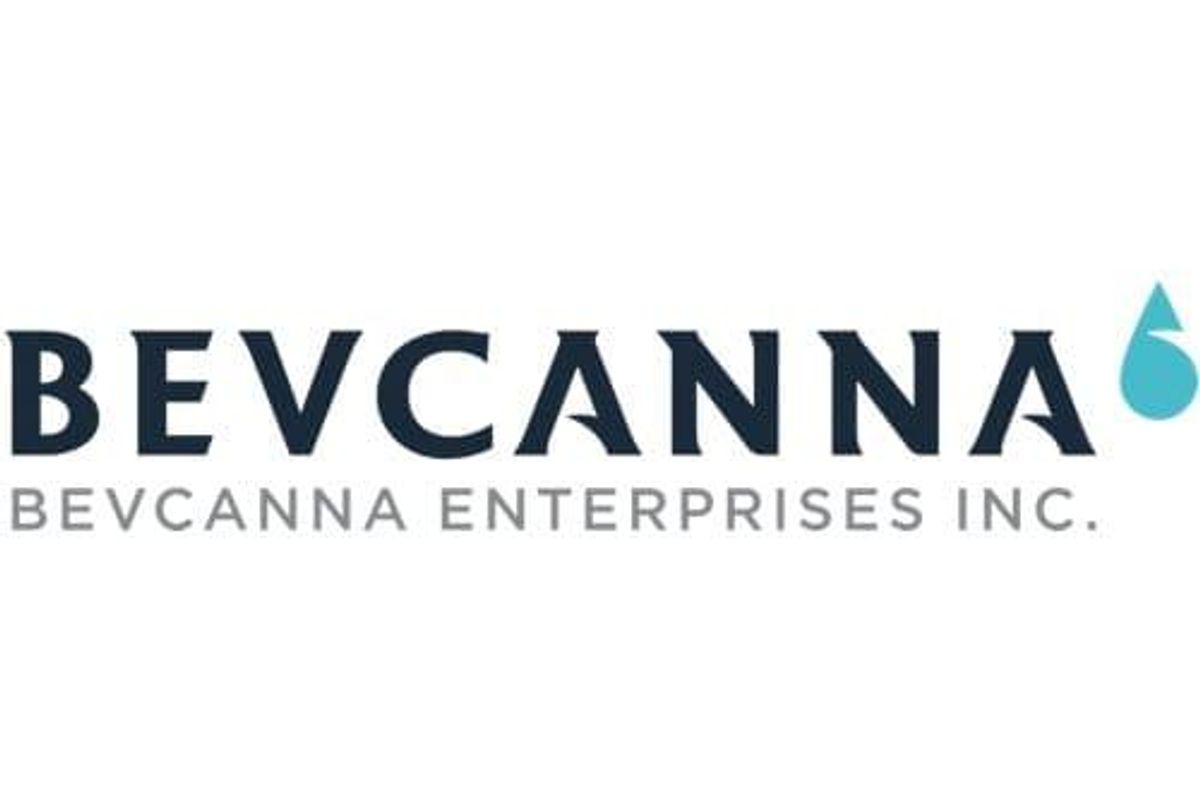
The coming together of two Canadian beverage industry leaders will form a unique vertical in the plant-based mineral and cannabis beverage sectors
Not for Distribution to U.S. Newswire Services or for Dissemination in the United States
Emerging leader in infused cannabis beverages, BevCanna Enterprises Inc. (CSE:BEV, Q:BVNNF, FSE:7BC) (" BevCanna " or the " Company ") announced today that it has signed a letter of intent (the " LOI ") dated November 24, 2020 with Naturo Group Investments Inc. (" Naturo " or the " Target "), a privately held company, pursuant to which the Company proposes to purchase all of the issued and outstanding securities of the Target (the " Target Securities ") from the owners of the Target (the " Transaction "). Upon completion of the Transaction, Naturo will become a wholly-owned subsidiary of the Company and the Company will carry on the combined business of Naturo and the Company.
BevCanna and Naturo have operated for the past three years under an exclusive partnership, including a master license agreement by which BevCanna has exclusive access to Naturo's 40,000 sq. ft. state of the art beverage manufacturing facility, pristine on-site alkaline spring water source, 315-acres of land for outdoor cultivation purposes and proprietary Health Canada approved fulvic and humic plant-based mineral formulation. As per Naturo's latest independent estimate pricing report as of February 2020, Naturo's enterprise value is between C$38M-C$42M.
The proposed combination will create a unique fully licensed white-label beverage manufacturing and distribution company, with a global multi-channel distribution network of traditional retail and cannabis sales channels. BevCanna will take ownership of the 40,000 sq. ft. beverage facility, and 315-acres of cultivatable land valued at $10.4M, and beverage manufacturing equipment which is valued $3.4M as of year end, and exclusive onsite alkaline spring water source independently valued at $18M. BevCanna will also own the Naturo flagship brand, TRACE, which currently enjoys a leadership position within the Canadian fulvic/humic category and is sold in more than 3,000 Canadian retail stores, with select international agreements and partnerships under review.
Along with their nationally distributed alkaline and sparkling waters, TRACE is expanding its product selection to nutraceuticals and is incorporating additional nutraeceuticals and herbal remedies, including cannabinoids, adaptogens, and nootropics, in domestic and international markets.
For BevCanna, the agreement will eliminate future payment liabilities under BevCanna's current lease agreement, royalty agreement and manufacturing agreements with Naturo. These eliminated agreements and fees will preserve future working capital and allow BevCanna to direct more resources towards its operations and shareholder value. The proposed company will combine the decades of consumer packaged goods (" CPG "), capital markets, corporate strategy and public company expertise of both operational teams.
"We believe that the joining together of these two companies will be an unbeatable combination," said Marcello Leone, Founder of Naturo and CEO of BevCanna. "Creating innovative beverages that consumers will love, whether mineral or cannabis-based, wellness-focused or recreational, continues to be our passion. Now we're at a stage where a business combination will position us to provide incredible value for both organizations and bring two exceptionally experienced teams together, creating one of the largest CPG, cannabis beverage and natural products players in the industry."
"BevCanna has taken great strides in the past few years and in addition to its commercialized U.S. products, is now on the brink of commercialization across the Canadian market," said John Campbell, Chief Strategic Officer at BevCanna. "Our exclusive partnership with Naturo has been instrumental in our success and it's now time to formalize the relationship and bring together the strengths of both companies."
The Transaction
The LOI provides that the Company will acquire all of the Target Securities outstanding as at the closing (the " Closing ") of the Transaction from the securityholders of the Target (the " Vendors ") in exchange for the issuance of approximately 50,000,000 common shares of the Company (each, a " Consideration Share ") to the Vendors at a deemed price of $0.40 per Consideration Share. The parties have agreed to negotiate and execute a definitive agreement in respect of the Transaction on or before January 22, 2021 which will replace and supersede the LOI.
It is expected that, upon completion of the Transaction, the former securityholders of the Target will own approximately 32% of the issued and outstanding common shares of the Company and no new "control block holder" (as such term is used in the policies of the Canadian Securities Exchange (the " CSE ")) will be created. The board of directors of BevCanna is expected to remain the same following the completion of the Transaction. The Transaction is not expected to constitute a "change of business" or "fundamental change" of the Company in accordance with the policies of the CSE.
Conditions of the Transaction
Completion of the Transaction remains subject to, among other things, satisfactory due diligence by the parties, entry into the definitive agreement, approval of the CSE, if applicable, receipt by BevCanna of a third party valuation of Naturo, approval of the shareholders of each of the Company and Naturo, as applicable, BevCanna having sufficient cash assets at the Closing to operate the combined businesses of the companies; and other conditions which are customary for transactions of this nature.
Some or all of the Consideration Shares issued may be subject to an escrow agreement, to be effective as of the Closing, pursuant to the policies of the CSE. The Transaction will be completed pursuant to available exemptions under applicable legislation. No finder's fee will be paid in connection with the Transaction. Naturo, which is controlled by Marcello Leone, the CEO of BevCanna, has agreed to exclusively negotiate with BevCanna until the termination of the LOI. Closing of the proposed Transaction is expected to be on or before March 31, 2021.
This news release does not constitute an offer to sell or a solicitation of an offer to buy the securities described herein in the United States. The securities described herein have not been and will not be registered under the United States Securities Act of 1933, as amended (the "Act"), or any state securities laws and may not be offered or sold in the United States or to the account or benefit of a U.S. person absent an exemption from the registration requirements of such Act.
Completion of the Transaction is subject to a number of conditions, including CSE acceptance. There can be no assurance that the Transaction will be completed as proposed or at all.
Investors are cautioned that any information released or received with respect to the Transaction may not be accurate or complete and should not be relied upon. Trading in the securities of the Company should be considered highly speculative.
The CSE has in no way passed upon the merits of the proposed Transaction and has neither approved nor disapproved the contents of this news release.
About Naturo Group Investments Inc.
Naturo Group develops and manufactures beverages and consumer products for in–house brands and white label clients. With decades of experience creating, branding and distributing iconic brands that have resonated with consumers on a global scale. Naturo owns and operates nationally distributed house brands across Canada which are currently sold in more than 3000 Canadian retailers, including 7/11, Loblaws, London Drugs, Metro and Farm Boy, as well as online direct-to-consumers, via Amazon; and is expanding into the U.S. market in 2021. Based in British Columbia, Canada, Naturo Group owns a pristine alkaline spring water aquifer, a world–class 40,000–square–foot, HACCP certified manufacturing facility, with a current bottling capacity of up to 210M bottles per annum.
About BevCanna Enterprises Inc.
BevCanna Enterprises Inc. (CSE:BEV, OTCQB:BVNNF, FSE:7BC) develops and manufactures cannabinoid–infused beverages and consumer products for in–house brands and white label clients. With decades of experience creating, branding and distributing iconic brands that have resonated with consumers on a global scale, the team demonstrates an expertise unmatched in the emerging cannabis beverage category. Based in British Columbia, Canada, BevCanna owns the exclusive rights to a pristine spring water aquifer, access to a world–class 40,000–square–foot, HACCP certified manufacturing facility, with a current bottling capacity of up to 210M bottles per annum. BevCanna also recently acquired US natural health and wellness e-commerce platform Pure Therapy. BevCanna's vision is to be a global leader in infused innovations.
On behalf of the Board of Directors:
John Campbell, Chief Financial Officer and Chief Strategy Officer
Director, BevCanna Enterprises Inc.
Disclaimer for Forward-Looking Information
This news release contains forward-looking statements. All statements, other than statements of historical fact that address activities, events or developments that the Company believes, expects or anticipates will or may occur in the future are forward-looking statements. Forward-looking statements in this news release include statements regarding: the proposed terms of the Transaction; that the parties will enter into the definitive agreement regarding the Transaction; the anticipated date of closing of the Transaction; the consideration to be payable in connection with the Closing; the future business plans of Naturo and BevCanna; and the perceived benefits of combining the businesses of Naturo and BevCanna. The forward-looking statements reflect management's current expectations based on information currently available and are subject to a number of risks and uncertainties that may cause outcomes to differ materially from those discussed in the forward-looking statements.
Although the Company believes that the assumptions inherent in the forward-looking statements are reasonable, forward-looking statements are not guarantees of future performance and, accordingly, undue reliance should not be put on such statements due to their inherent uncertainty. Factors that could cause actual results or events to differ materially from current expectations include, among other things: that the parties may not be able to agree to terms for the definitive agreement by the agreed upon deadline or at all; that the CSE may not approve the Transaction as proposed or at all; that the parties may not be able to satisfy the conditions to closing of the Transaction, including approval by the shareholders of one or both parties, as applicable; general market conditions and volatility of commodity prices; and other factors beyond the control of the parties. The Company expressly disclaims any intention or obligation to update or revise any forward-looking statements whether as a result of new information, future events or otherwise, except as required by applicable law.
View source version on businesswire.com: https://www.businesswire.com/news/home/20201124006007/en/
For media enquiries or interviews:
Wynn Theriault, Thirty Dash Communications Inc.
416-710-3370
wynn@thirtydash.ca
For investor enquiries:
Luca Leone, BevCanna Enterprises Inc.
604-880-6618
luca@bevcanna.com
